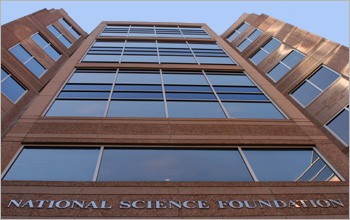News Release 05-163
NSF Is Second-Best Gov't Agency for Workers
Report says employees rival private sector counterparts

The second-best work place in the U.S. government, NSF is located in Arlington, Va.
September 20, 2005
This material is available primarily for archival purposes. Telephone numbers or other contact information may be out of date; please see current contact information at media contacts.
The National Science Foundation (NSF), the independent federal agency that supports fundamental research and education across all fields of science and engineering, ranks second as the best place to work in the federal government, according to a survey of some 150,000 of its employees. What's more, the good feelings were generally the same among men and women, people of different races or ethnicity and among people of different ages.
Formally published by the Partnership for Public Service (PPS) and the American University's Institute for the Study of Public Policy Implementation, the findings drew on responses of the U.S. Office of Personnel Management's most recent Federal Human Capital Survey.
NSF ranked second (75.0) behind the Office of Management and Budget (77.5) and ahead of the Nuclear Regulatory Commission (74.8). Overall, smaller agencies rated higher than larger ones did.
According to PPS, the key drivers behind workplace satisfaction and engagement are effective leadership and a good match between employee skills and the mission of the organization. It also says this years' best places to work represent "the future of the federal civil service: highly-engaged and highly-skilled workers performing critical tasks with a professionalism and efficiency that rivals their private sector counterparts."
About NSF, the report specifically says:
NSF – second in the Best Places agency rankings – is at the center of the effort to support America's scientific advancement, innovation and competitiveness. With an annual budget of $5.5 billion, NSF is the source of 20 percent of all federally-funded basic research and the key supporter of work in the areas of computer science, mathematics and the social sciences. Through the issuing of about 10,000 merit-based grants per year, NSF has fueled a wide range of discoveries and innovations from past successes such as the creation of the Internet, bar codes and fiber optics, to emerging fields such as nanotechnology. The NSF organizational culture is grounded in its scientific mission, incorporating the best elements of the academic and research organizations it supports. Senior managers work hard to promote a collegial environment, and subject matter experts from major universities are rotated through departments on one to two year assignments to ensure fresh thinking and the most up-to-date practices and perspectives. Beyond the internal work environment, employees are encouraged to be active participants in their research communities by delivering presentations, attending conferences, and making on-site visits to collaborate with their grantees.
"As this survey suggests, an organization is only as good as its people," said NSF Director Arden L. Bement, Jr. "We will look at these results as a validation of our commitment to an excellent workforce and our federal mission, but we can't rest on these laurels. We will 'try harder.'"
Read more about NSF.
Read the full "Best Places to Work" report.
-NSF-
Media Contacts
Leslie Fink, NSF, (703) 292-5395, email: lfink@nsf.gov
The U.S. National Science Foundation propels the nation forward by advancing fundamental research in all fields of science and engineering. NSF supports research and people by providing facilities, instruments and funding to support their ingenuity and sustain the U.S. as a global leader in research and innovation. With a fiscal year 2023 budget of $9.5 billion, NSF funds reach all 50 states through grants to nearly 2,000 colleges, universities and institutions. Each year, NSF receives more than 40,000 competitive proposals and makes about 11,000 new awards. Those awards include support for cooperative research with industry, Arctic and Antarctic research and operations, and U.S. participation in international scientific efforts.
Connect with us online
NSF website: nsf.gov
NSF News: nsf.gov/news
For News Media: nsf.gov/news/newsroom
Statistics: nsf.gov/statistics/
Awards database: nsf.gov/awardsearch/
Follow us on social
Twitter: twitter.com/NSF
Facebook: facebook.com/US.NSF
Instagram: instagram.com/nsfgov


